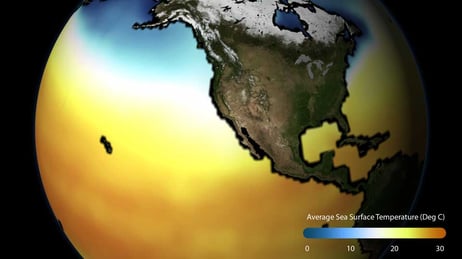 Phytoplankton carry out around half of all photosynthesis on Earth. They lower CO2 concentrations in the oceans, add oxygen to our atmosphere, and are the basis of most ocean and many freshwater food chains. When they die, phytoplanktons also sequester carbon in the deep ocean as they sink towards the ocean floor. The organisms’ close relationship with CO2 and the carbon cycle means that climate change scientists need to understand how global warming will alter phytoplankton populations. Additionally, ecologists wish to understand phytoplankton to predict the oceans’ future health.
Phytoplankton carry out around half of all photosynthesis on Earth. They lower CO2 concentrations in the oceans, add oxygen to our atmosphere, and are the basis of most ocean and many freshwater food chains. When they die, phytoplanktons also sequester carbon in the deep ocean as they sink towards the ocean floor. The organisms’ close relationship with CO2 and the carbon cycle means that climate change scientists need to understand how global warming will alter phytoplankton populations. Additionally, ecologists wish to understand phytoplankton to predict the oceans’ future health.
Water temperatures significantly affect the limits of phytoplankton growth rates: populations near the equator have the potential to grow much faster than strains found in cooler waters, near the poles, given sufficient nutrients. The researchers of this study believe that current models underestimate the effects of rising temperatures on ocean ecosystems. Such models focus on indirect mechanisms, such as how rising temperatures lead to fewer nutrients in surface ocean waters. This study therefore investigated the direct effect of higher temperatures on individual phytoplankton species.
The scientists used an eco-evolutionary model to investigate how phytoplankton adapts to current ocean temperatures. They also used species distribution models, to predict how ocean temperature changes would affect populations.
 The results suggest that by the end of the 21st century, warmer oceans will lead to a greater diversity of plankton populations nearer the poles, but fewer varieties in warmer, tropical waters at the equator. Even though marine organisms can disperse over long distances carried by ocean currents, each plankton strain grows best at an optimum temperature and adapts to its local environment. Tropical strains appear to be most vulnerable to rising temperatures. The researchers predict that around a third of current strains in the tropics would become extinct by 2100 if mean temperatures increase by just 2°C. However, high genetic diversity within species may prevent the loss of entire species.
The results suggest that by the end of the 21st century, warmer oceans will lead to a greater diversity of plankton populations nearer the poles, but fewer varieties in warmer, tropical waters at the equator. Even though marine organisms can disperse over long distances carried by ocean currents, each plankton strain grows best at an optimum temperature and adapts to its local environment. Tropical strains appear to be most vulnerable to rising temperatures. The researchers predict that around a third of current strains in the tropics would become extinct by 2100 if mean temperatures increase by just 2°C. However, high genetic diversity within species may prevent the loss of entire species.
Rising temperatures will thus affect phytoplankton in different ways, depending on their location. Until we learn more about how phytoplankton evolves, there is significant uncertainty regarding how these organisms will respond to climate change and to what extent we can rely upon them to remove CO2 from our atmosphere. The future health of the ocean ecosystems that depend on them is also threatened.
Source: European Commission News Alert: Science for Environment Policy
Thomas, M.K., Kremer, C.T., Klausmeier, C.A., and Litchman, E. (2012) A Global Pattern of Thermal Adaptation in Marine Phytoplankton. Science. 338: 1085-1088.
